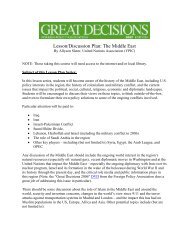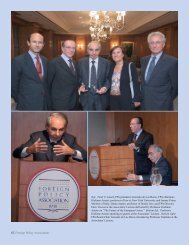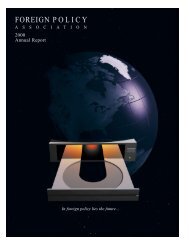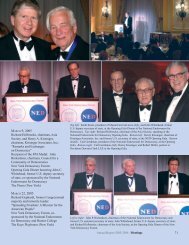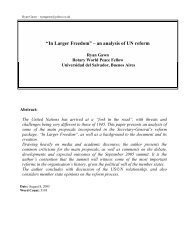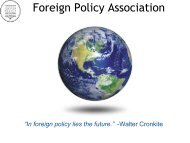Celebrating 90 Years - Foreign Policy Association
Celebrating 90 Years - Foreign Policy Association
Celebrating 90 Years - Foreign Policy Association
You also want an ePaper? Increase the reach of your titles
YUMPU automatically turns print PDFs into web optimized ePapers that Google loves.
pleased by what the accomplishments we have<br />
been able to help others make have meant to<br />
them, but Americans also would be more willing<br />
to support the kind of grassroots engagement that<br />
builds relationships and creates a real bedrock for<br />
democracy in country after country.<br />
BREAKING THROUGH IDEOLOGICAL WALLS<br />
I also believe that if we were able to humanize<br />
foreign policy issues better than we have in recent<br />
times, we would have much more response from the<br />
Congress, because Members of Congress would also<br />
begin to understand these issues. Remember, we<br />
have 100 members of the House of Representatives<br />
who have never had a passport. We have the<br />
majority leader of the House of Representatives<br />
saying, “Why does one need a passport? I left the<br />
country to go to Europe once in 1982, and that was<br />
enough for me.” Unless we can break through that<br />
kind of ideological wall with stories of human interest,<br />
with stories people can understand, our task will be<br />
harder than it needs to be.<br />
We will have to think about the challenges<br />
we face in order to make sure that the work of the<br />
<strong>Foreign</strong> <strong>Policy</strong> <strong>Association</strong> does all that it can do<br />
to give us the support we need. We certainly have<br />
some very good examples from the past. One<br />
of my favorites is what happened related to the<br />
Marshall Plan. Leaders such as Harry Truman and<br />
George Marshall not only had the vision to devise<br />
the plan, but they understood how difficult it would<br />
be to sell the plan. They therefore enlisted literally<br />
hundreds of Americans, from business executives<br />
to academics to religious leaders, to speak in every<br />
small town and on every college campus they could<br />
reach to talk about what was at stake. And out of<br />
that great commitment to public education at the<br />
end of World War II came not only the Marshall<br />
Plan, but also support for U.S. leadership.<br />
FUTURE STRUCTURES AND INSTITUTIONS<br />
As we began to create the structure that we<br />
now look to to lead us into the future—the United<br />
Nations, the World Bank, the IMF, and NATO—<br />
certainly we’re going to have to take a hard look<br />
again at whether or not we have the structures<br />
and institutions we need and whether they are<br />
functioning as well as they should. In order to<br />
bring that about, we need something comparable<br />
in terms of a public-education effort.<br />
I would challenge first the Congress to<br />
live up to its commitments, to pay our debts,<br />
to maintain support for international lending<br />
institutions, to boost funding for programs like<br />
AID, to understand how important it is to support<br />
rhetorically America’s engagement in the worId,<br />
and to reach out to America’s citizens to be part of<br />
that engagement.<br />
I would challenge business leaders to be sure<br />
that they support America’s leadership around<br />
the world. I have found, unfortunately, that there<br />
has been a drop-off in elite opinion support for<br />
foreign engagement. Many business leaders<br />
today spend more time traveling around the world<br />
than their predecessors did a generation ago, but<br />
they speak up less on behalf of what we need<br />
to do to maintain our engagement, and they are<br />
not involved in helping to educate their peers or<br />
supporting programs in Congress.<br />
We certainly have some very good<br />
examples from the past. One of my<br />
favorites is what happened related to<br />
the Marshall Plan. Leaders such as<br />
Harry Truman and George Marshall<br />
not only had the vision to devise<br />
the plan, but they understood how<br />
difficult it would be to sell the plan.<br />
They enlisted literally hundreds of<br />
Americans, from business executives<br />
to academics to religious leaders, to<br />
speak in every small town.<br />
FOREIGN POLICY ASSOCIATION | 15<br />
PRESENTATION BY HILLARY RODHAM CLINTON




